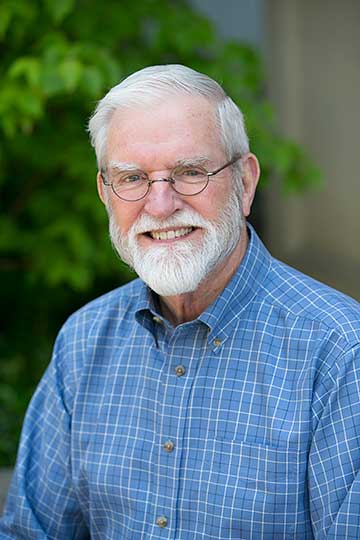
It was in the early 1950s when a teenage Lyle Dorsett and his family first moved to Birmingham from Kansas City, Missouri. They were outsiders, often labeled Yankees by peers. Birmingham was not home.
But something happened one summer evening in 1953. Dorsett was walking to his house after work and decided to take a shortcut through the campus of then-Howard College (now Samford University).
He was immediately intrigued by the sight he saw: a large tent on the football field featuring a dynamic preacher on an elevated platform. Later he would learn that it was a Baptist revival meeting. As Dorsett drew near, he could hear evangelist Eddie Martin preaching on Luke 15:11-31, known as the parable of the prodigal son, calling other prodigals to come home. Dorsett wasn’t a bad person, he said, but that night, “I knew I was the prodigal . . . and I knew I was lost and . . . needed to come home.”
Martin asked those in attendance to return the next evening. Dorsett came early, and this time was seated inside the tent. When the call came, “the evangelist led me through a sinner’s prayer. I confessed my need for forgiveness. While being led in prayer, I strongly felt the presence of Jesus Christ. I sensed his love and forgiveness as well as his call to preach the gospel.” Dorsett was 15 years old.
Shortly thereafter, Dorsett and his parents joined a local Baptist church. He also met two Howard students who took him under their wings involving him in their preaching ministry. However, 18 months later, Dorsett’s family moved back to Kansas City. On his return, the Kansas City he had left was not the same. He didn’t feel like he fit there anymore; he didn’t feel at home.
Although Dorsett never sought to turn from the Lord, gradually he drifted. During his time in college, he embraced a materialistic worldview and sought academic achievements. He received a Ph.D. in history. His new life goals were to become the best historian and to write history books. Despite professional success, he began to drink heavily and became an alcoholic. His wife, Mary, who became a Christian after their marriage, began to pray.
One evening, he stormed out of the house after Mary asked him not to drink around the children. He found a bar and drank until closing. While driving up a winding mountain road, he stopped at an overlook and blacked out. The next morning, he woke up on a dirt road at the bottom of a mountain next to a cemetery not having any memory of the drive.
Dorsett cried out to God, “Lord, if you are there, please help me.” At that moment, he recognized that the same presence he had met at Howard College was with him in the car and loved him. The prodigal son had finally, truly come home.
Eventually, Dorsett was called to full-time ministry and was ordained in the Anglican Church. In 1983, Dorsett became the second director of Wheaton College’s Marion E. Wade Center and joined the college’s graduate school faculty, where he directed the Master of Arts in evangelism program and taught courses in history, evangelism and Christian formation for 15 years. Also during his time at Wheaton, he and Mary led a team that planted the Church of the Great Shepherd (Anglican Church in North America) in the western suburbs of Chicago.
In 2005, 52 years after that tent meeting, Dorsett returned to the university where an evangelist had introduced him to Jesus to teach evangelism at Samford as Beeson Divinity School’s Billy Graham Professor of Evangelism. The city where he had once felt like an outsider he has now called home these last 12 years.
In his role at Beeson, Dorsett has taught courses on C.S. Lewis, evangelism and spiritual warfare, and pastoral theology, to name a few. In 2007, Dorsett and Mary planted Christ the King Anglican Church on the campus of Samford, which meets in Beeson Divinity’s Andrew Gerow Hodges Chapel. Actively serving in pastoral ministry has been important for Dorsett in helping prepare future ministers. Over the last 10 years, he has mentored many divinity students, who have served as interns at Christ the King.
In May 2016, Mary was diagnosed with stage 4 metastatic breast cancer. Now, in this next chapter, Dorsett wants to spend most of his time with his wife. At the end of the 2018 spring semester, Dorsett will retire from Beeson Divinity School. He and Mary hope to travel to some of their favorite places.
Timothy George, dean of Beeson Divinity, said Dorsett is one of the most remarkable Christians he has known. “Scholar, pastor, teacher, historian, evangelist, activist, prayer warrior, yes, but at his core is a heart on fire for Jesus Christ. Since coming to Beeson, he has had a transformative influence on our entire community. We love him and Mary dearly and thank God for the gift of their presence and ministry in our midst.”
As Dorsett reflected on his return to Birmingham and Samford, he said, “The years I have had the privilege to teach at Beeson have been the most fulfilling of my 53-year teaching career. My memories of Beeson are like one long and beautiful dream.”
The full article first appeared in the 2018 Beeson magazine.
Learn more about Dorsett’s story by reading a story he wrote for Christianity Today in 2014 called, “A Sobering Mercy,” and by listening to a sermon he gave in Hodges Chapel in 2014 called, “Back Home at Last” at youtube.com/ beesondivinity.
